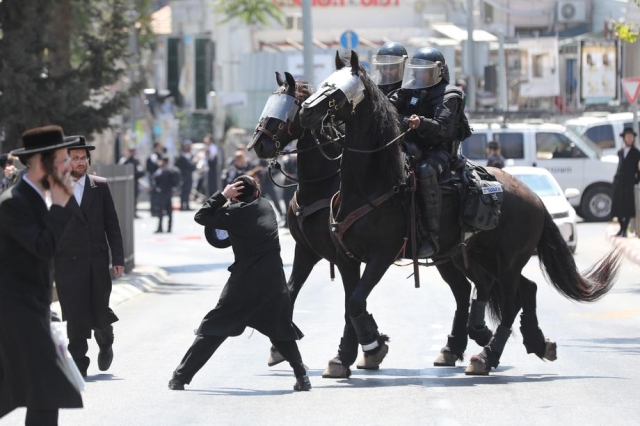The separation of church and state in Israel is tricky business. For starters, Israel, at its very core, is a democracy, but with the Jewish faith and people as the reasoning for its foundation. Many Israeli laws are based on biblical ones, and the Judicial system in Israel often uses biblical Judeo-Christian laws as the basis for decisions made in modern court cases.
The constant question that is debated amongst Israeli politicos is where biblical or religious values end and “modern common sense” kick in. A perfect example of this ongoing debate was pictured throughout Jerusalem recently, surrounding the strangling of a 4-year-old toddler who was part of an Ultra-Orthodox sect of Judaism.
The Israeli Supreme Court accepted the petition of the family of a 4-year-old strangled to death, allegedly by his uncle, and decided that an autopsy will not be performed on the child. In doing so, the supreme judges overturned a local Court's decision. In addition, it was allowed to publish the child's name, Uriel Oberlander.
Happening now in Jerusalem, Haredim protesting something. Seriously, why would anyone burn their own neighborhood?
— Jay Engelmayer | #JusticeforMalkiRoth (@jengelmayer) August 14, 2022
For people who live by the Torah and dissect Halacha letter by letter they sure know how to make a chilul hashem - giving anti zionists fuel to berate Israel. pic.twitter.com/YyzgLtcPze
In Jewish law, it is strictly prohibited to be buried with any permanent markers such as scars or tattoos. The law makes autopsies a complicated issue for many observant Jews.
Hundreds of ultra-Orthodox people protested in Jerusalem and other cities against the autopsy of the 4-year-old's body. Heavy traffic was recorded at the entrance to Modi'in Illit. The Jerusalem Faction, an extreme ultra-Orthodox current, called for ultra-orthodox protesters to participate in the demonstrations and "to embark on a massive campaign for dishonoring the dignity of the dead."
@IL_police deal with Ultra-Orthodox blocking #Jerusalem streets to protest autopsy of 4-year-old boy allegedly killed by his uncle. The High Court since ordered the boy’s body turned over to the family for burial without autopsy. Photos by Yosef Mizrahi/TPS.#TPS_One_Photo_a_Day pic.twitter.com/LpZVp1ewAP
— TPS - Israel's News Agency (@TPS_News_co_il) August 15, 2022
On Saturday, the 4-year-old passed away in Shaare Zedek Hospital after his uncle, who had a history of mental issues, allegedly strangled him. The boy was found lying on the floor with signs of strangulation after family members broke the door of the room he was in - which was locked. The autopsy was set to confirm the cause of death, which would go a long way towards charging and convicting the uncle. Now, without the hard evidence, the case is based solely on circumstantial evidence. While it is likely, that the uncle killed the child, prosecuting him under Israel's judicial laws might prove difficult.
Israel's justice system is similar to many in the west; defendants are entitled to a fair trial and can challenge prosecution evidence; without the autopsy results, it would give the defense an advantage as they will be arguing against an opinion, not a fact.
4-year-old Jerusalem boy dies after allegedly being choked by uncle | The Times of Israel https://t.co/OMTIydCbZh
— Peter Holand (@PeterHoland5) August 14, 2022
After the death of the 4-year-old, the police performed a CT scan and blood tests at the Institute of Forensic Medicine in Abu Kabir. Later, the police arranged to perform an autopsy at the institute to ascertain the circumstances of the child's death. Still, his parents objected due to religious reasons and appealed with the assistance of the legal department of the Zaka organization to the Jerusalem Magistrate's Court.


